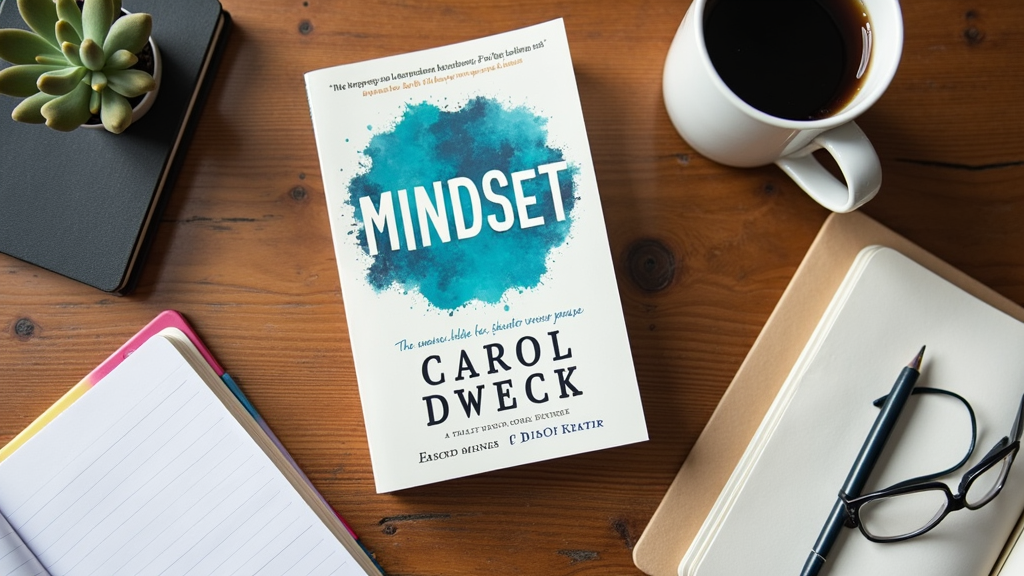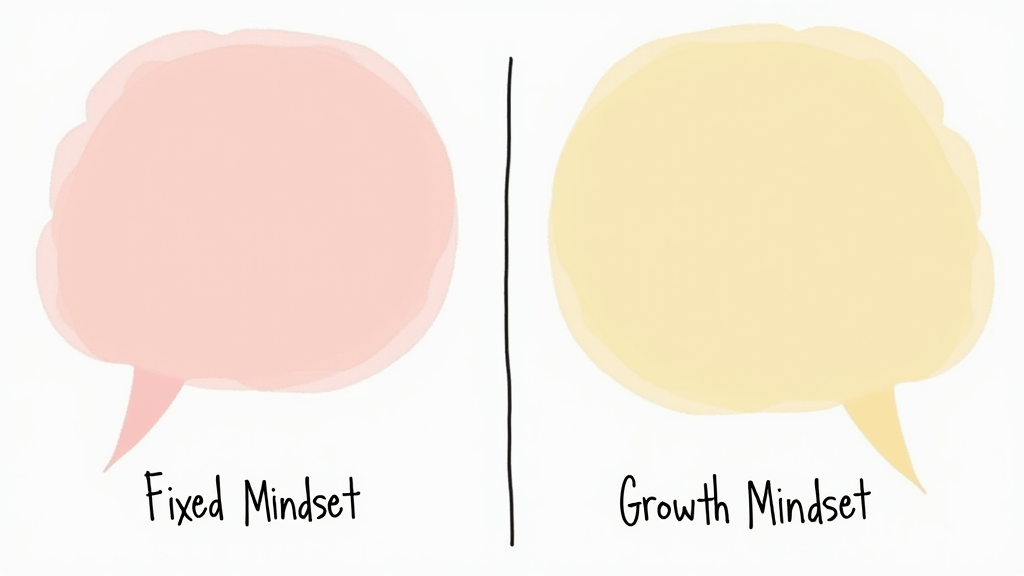“Mindset” by Carol Dweck is the kind of book that lingers in your mind long after you finish. If you’re interested in stepping up at work, sports, school, or relationships—pretty much anything—this book gives you a fresh perspective on how you see yourself and the world. Dweck, who’s a psychology professor at Stanford, boils her research into something everyone can relate to: it’s not just about smarts or talent, but how you think about those things. She calls it your “mindset.” Even though the idea seems simple at first, once you start checking out how it influences every part of your life, you realize how deep this really goes.
If you’ve ever wondered what mindset actually means or are curious why this book’s made such waves, this breakdown is for you. Here, you’ll stumble upon the core lessons, practical advice, and why so many people keep recommending it. Ready? Let’s get into the essentials…

Book Title: Mindset: The New Psychology of Success
Author: Carol S. Dweck, Ph.D.
Genre: Psychology / Self-Help
First Published: 2006, updated a few times since
Page Count: About 320 pages
Main Themes: Growth mindset, fixed mindset, learning, achievement, personal change
Who It’s For: Students, parents, teachers, athletes, business leaders—anyone interested in personal development
Overall Rating: 4.8/5 (from Goodreads, Amazon, and more)
Where to Buy: Amazon, Barnes & Noble, local bookstores—available in print and audiobook.
Quick Look at Mindset: Growth and Fixed
If you only remember one thing, it’s this: people generally lean toward two main mindsets—fixed or growth. Dweck figured this out after digging for years into what makes people successful. Here’s the basic rundown:
- Fixed mindset: Believing your abilities, intelligence, and talents are set. You either have them or you don’t. Folks with this mindset usually avoid challenges, are quick to feel defensive about mistakes, and see effort as a sign of weakness.
- Growth mindset: Believing you can get better at nearly anything with effort, smart strategies, and lessons from failure. Challenges are appealing here because they help you grow.
This sounds simple, but the real surprise comes when you start seeing how your mindset shapes every area—how you deal with setbacks, how you pick up new skills, and how you act around other people.
About Carol Dweck, The Researcher Behind It All
Carol Dweck has serious credentials. Decades of motivation, personality, and development research back up her claims. She’s a Stanford professor and her findings come from real studies, not guesses. Dweck’s journey began with one question: why do some people keep at it after failure, while others give up for good? This curiosity took her into classrooms, sports fields, boardrooms, and artists’ studios, checking out every angle.
She’s published a mountain of research outside “Mindset,” and you’ll find her in talks, podcasts, and top media. Dweck isn’t just another advice columnist; her work is respected among leading psychologists globally. For more on her academic side, look at her Stanford profile or Wikipedia page.
Central Idea: Why Mindset Is So Important
Mindset’s power is in how it colors everything—from tough exams to personal setbacks or career leaps. Dweck invites you to try seeing yourself as capable of growth and change, no matter your starting point. Repeated research shows this pays off: people who think they can grow actually do, again and again.
With a growth mindset, you’ll take chances, tough it out when things get tricky, ask for backup, and treat feedback like guidance instead of a putdown. Those locked in a fixed mindset avoid the hard stuff, treat setbacks as signals they can’t cut it, and give up when the going gets tough. This isn’t only about tests or trophies—it’s about how you tackle life in general.
Key Takeaways From “Mindset”
1. You Can Change Your Mindset—It’s Not Set in Stone
Dweck doesn’t shame readers for falling into fixed ways of thinking. She knows these patterns are built up over years: through the things people say to us or how we interpret results. The good news? You can shift from a fixed mindset to a growth-focused one. Start by tuning into your inner voice and experimenting with tiny, daily swaps in your thinking.
- Notice self-talk—if you’re saying, “I’m terrible at this,” that’s fixed mindset talking.
- Try, “I can’t do this yet.” Just adding “yet” leaves the door open for learning.
- Dweck suggests journaling and self-reflection exercises, plus using her mindset platform.
2. Praise The Process—Not Just Smarts
This tip is golden for parents and teachers. Dweck’s research proved that saying, “You’re brilliant!” to kids actually discourages risk-taking. Kids praised for effort (“You worked so hard on that!”) become more resilient and adventurous, while those praised for being smart shy away from challenge. The same goes for everyone: process-oriented praise builds grit and learning muscles.
- Praising effort and creative strategies—and sharing mistakes openly—can reshape what kids and adults believe they’re capable of.
3. Failure = Feedback, Not The End
One big lesson: failure doesn’t have to mean disaster. In the growth mindset, every setback is just information, not judgment. Rather than seeing mistakes as evidence you “don’t have it,” treat them as directions for your next step. The world’s most accomplished people aren’t immune to failure—they just jump back in and adjust faster than most.
- When things flop, ask, “What can I pick up from this?” instead of, “Why do I suck?”
4. Challenges Are Worth Chasing
Instead of running from hard stuff, try seeing it as a source of growth. Growth-minded people go after tasks just outside their comfort zone, whether that’s taking a tough class, launching a project at work, or experimenting with a new skill. Dweck’s research shows those who put themselves out there learn more, stress less about messing up, and get bolder over time.
- Look for stretch assignments and ask for honest feedback, even when the truth stings.
5. Feedback is Your Free Teacher
People with fixed mindsets often ignore or bristle at feedback, but in a growth mindset, it’s a tool. Dweck shows the most successful performers actively seek out critiques, not praise. When the goal is to get better (rather than just look good), you’ll actually appreciate guidance—and see faster gains.
- Request concrete advice—“How can I approach this differently?”—and reflect on what you get.
- A growth-mindset culture at work or school leads to higher morale and more innovation.
6. Talent Isn’t Your Fate
Forget the myth that only the “naturally gifted” reach the top. Dweck’s studies highlight musicians, athletes, and inventors who got there not by inborn genius but by grinding through deliberate practice, learning from coaches, and pushing through failure. If you treat talent as something you build, not something you’re simply handed, you’ll go further, longer.
- Brains and skills develop the more you use them; even “late bloomers” can leap ahead with the right mindset.
7. Mindset Colors Your Relationships
Your beliefs about growth or limitation spill into every connection, not just solo goals. A fixed mindset often expects others to stay the same, or treats arguments as threats. With a growth approach, you assume people—including yourself—can improve. Relationships (romantic, family, or at work) become a place for learning rather than criticism or competition.
- Resilient relationships make room for change and encourage open struggles, rather than covering up mistakes or blaming partners for every setback.
8. Your Beliefs Shape Your Reality
At the heart of Dweck’s argument: the way you talk to yourself becomes the script you live by. Thinking “I can’t do it” makes you less likely to try. But even a hint of belief in improvement nudges you to work, practice, and reflect—and you actually start getting better as a result. Change your beliefs to set the stage for real progress.
9. Mindset is Ageless—It’s Never Too Late
Dweck’s work covers all ages, from elementary students to retirees. Growth mindset isn’t something you have or you don’t—it’s a skill you practice, no matter how set in your ways you think you are. Whenever you notice a negative story running through your mind, you have an opening to change it, one choice at a time.
10. Shifting Mindset Is an Ongoing Adventure
No one is growth-minded every second. Even Dweck admits she sometimes slips back into fixed patterns. The goal isn’t perfection; it’s self-awareness and steady practice. As you spend time around others who think this way, that energy and approach start to rub off, making it easier to stick with over time.
Stories That Bring It to Life: Real People, Real Progress
Mindset is full of stories that keep the concepts fresh and relatable. Dweck uses classroom turnarounds, Olympic comebacks, and famous figures like Michael Jordan—who got cut from his high school basketball team and let that setback fuel his historic NBA career. On the flip side, she profiles stars like John McEnroe, who was quick to pin losses on anyone but himself, missing chances to adapt.
- Schools where teachers encourage growth show jumps in test scores and motivation.
- Companies adopting growth principles have fewer layoffs and more creativity, even under pressure.
- Artists and scientists flourish by treating rejection as part of their craft, not the end of the road.
Mindset in Education: Upgrading Learning for Teachers and Students
Some of Mindset’s most eye-opening parts are about education. Dweck shows that when teachers focus on learning and effort—rather than always nailing the right answer—students get braver and go further. Even small switches, like praising someone’s persistence instead of just their success, can build confidence and grit.
- Teachers who highlight stories of struggle normalize setbacks and help kids take risks without embarrassment.
- Short-term lessons on mindset have been linked to higher test scores and less dropout, even in tough school districts.
If you’re thinking of bringing this to your classroom, Dweck’s Mindset Works offers lesson plans, posters, and resources for all ages and teaching styles.
Mindset at Work: Teams and Innovation Unleashed
Growth mindset isn’t just for classrooms; it’s a business game-changer. Dweck charts how companies—old and new—transform when they reward learning, not just superstar performances. In a fixed mindset workplace, people cover mistakes to protect their image, but where growth mindset takes off, teams share, adapt, and feel safer to take risks. Big names like Microsoft, Google, and Pixar have made these shifts, seeing real payoffs in both morale and results.
- Leaders who admit mistakes and model learning inspire risk-taking throughout the ranks.
- Performance reviews that assess growth and effort, alongside results, help employees experiment and grow skills.
- The sense that anyone can develop talents opens up more opportunity and builds loyalty.
How to Plant Growth Mindset at Work
- Make failure normal: Celebrate lessons from mistakes as much as you celebrate wins.
- Give props for learning: Praise people for stepping into the unknown, not just nailing the predictable stuff.
- Be open with feedback: Honest, constructive input—given and received—ups everyone’s game.
- Encourage out-of-the-box questions: Build spaces for curiosity, especially among new hires and junior team members.
Mindset and Parenting: How to Raise Resilient, Curious Kids
Parents are often surprised by how much kids pick up about ability and effort, sometimes just from a quick comment. Dweck’s suggestions are easy to use even if you’re not a psychology buff:
- Swap “You’re gifted” for “I’m proud of your effort and how hard you tried.”
- Respond to setbacks by asking, “What did you learn? How could you try again?”
- Encourage risk-taking and trying new things, even if there are stumbles at first.
- Be open about your own learning process—including your flops and comebacks.
Everyone slips up and falls back into fixed-mindset language at times. The aim is to spot it, adjust, and keep the focus on effort, learning, and the adventure of improvement.
Sports & Performance: The Real Path to Becoming a Champion
For sports fans or anyone obsessed with high performance, “Mindset” is a goldmine. Dweck unpacks stories of athletes who hit rock bottom, faced public criticism, or came back from brutal injuries—by putting all their energy into learning, practice, and adapting new strategies. You’ll see how growth mindset isn’t just about winning, but enjoying the process and going the distance.
- Athletes with growth mindsets keep getting better, even after losses, and bounce back season after season.
- Fixed-mindset players burn out or plateau early when competition toughens up.
- Coaches who focus on learning—not just natural talent—produce teams where everyone thrives.
Many top athletes say growth mindset also made training more fun, reduced pressure, and kept them experimenting and pushing boundaries.
Relationships: Mindset Makes a Difference in Love and Friendship
Mindset runs deep in our relationships. Couples stuck in a fixed pattern may expect easy magic and get discouraged with every bump. Growth mindset encourages seeing love and friendship as an ongoing adventure—including rough patches that can lead to deeper understanding and growth.
- Friends and partners who meet conflict with curiosity end up adapting together better over time.
- A growth approach gives everyone space to improve, learn from mistakes, and stay flexible.
- Arguments or setbacks aren’t dealbreakers—they’re part of the normal ride toward closeness and trust.
This attitude spreads beyond romance—to coworkers, friends, and even family, making every connection more rewarding and less pressured.
Busting Common Myths About Growth Mindset
Plenty of growth mindset misconceptions are floating around. Dweck clears these up:
- It’s not just “keep working hard” at all costs. If a strategy isn’t working, growth mindset means switching things up—not grinding forever without changing your approach.
- It’s not phony optimism. You don’t have to smile through setbacks. It’s natural to feel bad when things go wrong. Growth mindset is about dusting yourself off and getting smarter for next time.
- It doesn’t erase background or real challenges. Growth mindset opens possibility but doesn’t pretend away real differences in resources or luck. It helps you focus on what’s within your control.
Simple Tips to Practice Growth Mindset
Here’s how you can make growth mindset part of everyday life (straight from the book, plus some extra ideas):
- Use “yet” generously. Replace defeatist statements with, “I can’t do this—yet.”
- Spot your triggers. Anytime you catch yourself thinking “I’m just not good at…” challenge yourself to rethink it.
- Ask for regular feedback. This will start feeling easier as you practice, and you’ll progress faster.
- Focus on learning goals, not just outcomes. Try setting goals like, “I want to get better at presenting,” rather than only “I want to win the contest.”
- Track and celebrate process wins. Keep notes on where you stepped outside your comfort zone or improved—even little stuff counts.
- Reflect after mistakes. Take a moment to track down what you’d try differently next round.
- Share your growth mindset journey. Talk with friends, family, or coworkers about your own practice and swap tips or stories.
Handy Tools: Features and Extras From Mindset
- Stories & real research: Dozens of personal and case study stories from every field.
- Action steps: Exercises and self-checklists at each chapter’s end let you put ideas into play.
- Online guides: The Mindset Works site is loaded with toolkits for teachers, parents, and leaders.

FAQs About “Mindset”—What People Always Ask
Q: Does this stuff really change outcomes?
A: Yes. Growth mindset principles are backed by stacks of research in schools, sports teams, and real companies. While it won’t fix everything instantly, most people notice good changes quickly when they start these practices.
Q: Can anyone move from fixed to growth mindset?
A: Absolutely. Most folks have a blend of both. The trick is paying attention to your thought patterns and deliberately swapping in growth-mindset thoughts.
Q: How do I spot my own fixed mindset?
A: Listen for things like: “I’ll never get this,” or “I’m just not that type of person.” Recognizing these is the first step to switching gears.
Q: Does this mean hard work will make me the best at anything?
A: Not exactly. You might not turn into Beyoncé, but you can dramatically improve in most areas by sticking with the learning process. It’s about making progress over time.
Q: Will I need to keep a fake smile and positive attitude all the time?
A: No way. It’s perfectly normal to struggle or feel down about setbacks. What matters is getting back up and seeing every challenge as a learning shot.
Ways to Dig Deeper: Taking Growth Mindset Further
If “Mindset” whets your appetite for more, try these next steps:
- Watch Dweck’s TED Talk: “The Power of Believing That You Can Improve” (over 15 million views!)
- Explore Mindset Works: Courses, guides, and printables to use at home, in class, or at work.
- Look for professional trainings: Many companies now offer mindset development workshops.
- Listen to interviews and podcasts: Lots of shows feature Dweck, plus expert guests on related ideas.
Wrapping Up: Why Mindset Still Counts
I’ve checked out plenty of self-help and psychology books over the years, but “Mindset” is one I keep coming back to. It shines a light on our inner dialogue and what we believe about ourselves—without trying to sell perfection or a quick-fix. The point is regular practice, noticing your patterns, and gently nudging your thinking in the right direction. Whether you’re teaching, parenting, building a business, or simply looking to get better at a hobby, a growth mindset unlocks new possibilities.
Little shifts in how you see effort, mistakes, and goals ripple across your entire life. You also influence those around you: the students you teach, your kids, your team at work, or your friends. No one’s stuck forever. Even if you catch yourself slipping into fixed habits, you can always choose to mix it up and tilt toward growth—one thought at a time.

PS: Got thoughts on “Mindset” or stories about how you’re putting growth mindset to work? Leave a comment below! Or explore more tools and updates on Carol Dweck’s official Mindset Works site.
Inspired by the power of mindset? Take it a step further—discover how vulnerability fuels courage and connection in Daring Greatly by Brené Brown. Read next!

Chris is the voice behind Daily Self Wisdom—a site dedicated to practical spirituality and inner clarity. Drawing from teachings like Eckhart Tolle, Ramana Maharshi, and timeless mindfulness traditions, he shares tools to help others live more consciously, one moment at a time.
Learn more about Chris →
Leave a Reply